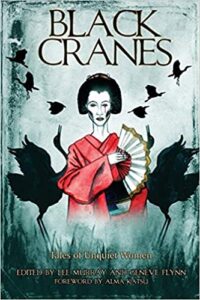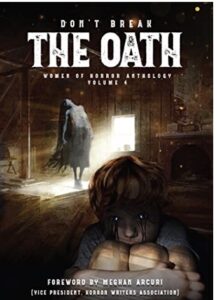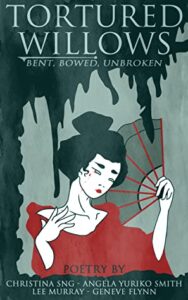
( Bookshop.org | Amazon.com )
Black Cranes: Tales of Unquiet Women, edited by Lee Murray and Geneve Flynn
Omnium Gatherum 2020
ISBN: 9781949054279
Available: Paperback, Kindle
Black Cranes: Tales of Unquiet Women is an anthology of stories by Southeast Asian women writers of horror. No one questions that the dangers cultures try to warn against in their ancient stories exist, but should we take the stories themselves as fact or fiction? The “unquiet” Southeast Asian mothers, daughters, wives, and girlfriends in Black Cranes ask this very question as they experience the the disturbing intrusion of these supernatural stories into their modern lives. Many of these characters think that by leaving home or separating themselves from their cultural roots, they can learn to forget, discount or even reject the stories they have grown up with about ghosts, terrifying beasts, bloodthirsty demons, deadly tricksters, and zombies only to find out that is impossible.
Several of the stories in this collection are built around characters from Asian myths and legends. The kapre, a tree demon, protects an infant and loves her for life, as kapres do, in “A Love Story” by Rin Chupeco. In Gabriela Lee’s “Rites of Passage,” no matter how an unmarried pregnant girl from Manila tries to escape, the demon child or tiyanak that she has killed will eventually make her pay. Nadia Bulkin asserts that “Truth Is Order and Order Is Truth” in her tale of a conquering Demon Queen who retakes her kingdom from the “fish people,” while the wily fox spirit of Rena Mason’s “Ninth Tale” masquerading as a beautiful woman vies for a tricky bride-to-be’s young man. There is also a daughter who is shocked into believing in a kwee-kia, a dead or miscarried child brought to life again, by catching her mother breastfeeding her own in “Little Worm” by Geneve Flynn. There is even a take on what started as a 1970’s Japanese urban legend involving the kuchisake-onna, or “slit-mouthed woman” in “A Pet Is for Life,” also by Geneve Flynn.
A few of these tales read like modern updates of older stories. Their focus is the clash of cultures within an individual’s psyche. Grace Chan’s “Of Hunger and Fury” explores the separation between a daughter and the mother who sent her into a foreign world for a better life. Chan’s poetic descriptions and strong sense of place enhance this tale of the superstition and deeply held beliefs that hold the old generation captive and threaten to erase those in the new who dare to ignore their roots or move beyond the past. The resulting sense of loss is revealed from the mother’s perspective in “Frangipani Wishes” by Lee Murray, in which the mother destroys her own life to forge a future for her daughter. In “Phoenix Claws”, also by Lee Murray, a young woman’s boyfriend is culture tested when he is offered chicken feet at a family meal. When she covers for him by eating the feet herself, she is given a supernatural punishment.
The remaining science fiction stories suggest what could happen when culture, relationships, and conflict reach the mythological future. Elaine Cukegkeng predicts the next iteration of overbearing mothers as those who can genetically alter their daughters. A “cosmetech” surgeon can upgrade his wife’s appearance in “Skin Dowdy” by Angela Yuriko Smith, but will she or he ever be satisfied? In Smith’s “Vanilla Rice,” a daughter threatens to undo her mother’s work by removing her physical trait chip. Finally, in “Fury” by Christina Sng, we find out what new horrors a pandemic will unleash and ask ourselves why the husband in “The Mark” by Grace Chan has a zipper on his chest.
There are so many ways into this horror collection: mythology, science fiction, legend, women’s issues, and cultural issues. Readers will appreciate the variety and be drawn in by the storytelling that leads us to believe that the horrors of the past are real, have not died, and are waiting to be reborn in the present. Recommended.
Contains: violence and sexual situations
Reviewed by Nova Hadley







Follow Us!